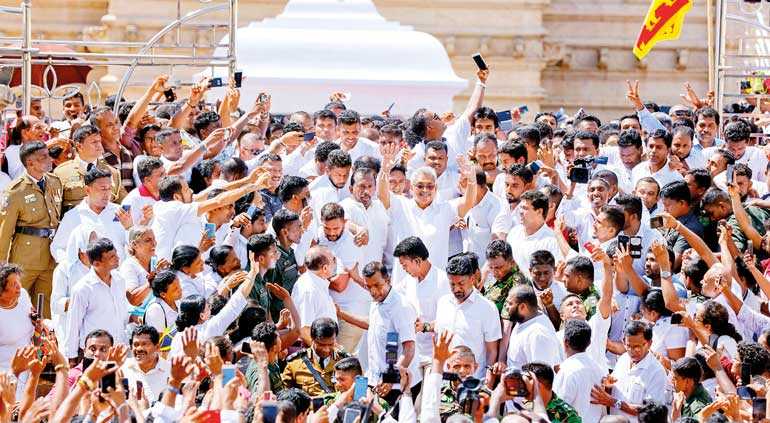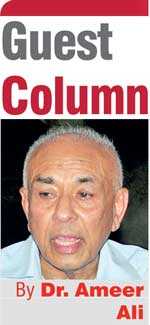Tuesday Feb 17, 2026
Tuesday Feb 17, 2026
Thursday, 12 December 2019 01:24 - - {{hitsCtrl.values.hits}}

President GR should be ever indebted to the Sangha, because without its tireless canvassing he would not have achieved what he did on 16 November. Given the volatile ethno-religious cleavages and unpredictably shifting alliances in the country, it was the sheer commitment of the Sangha to establish a political regime solely on the strength of Sinhalese voters that made GR the President. In a sense, GR’s victory was even more remarkable than the victory of SWRD in 1956. 
Throughout history, except during the colonial era, Sangha played a moralising role in the governance of the country. While monarchs took care of the welfare of the people and clergy, members of the Sangha in turn instructed and advised rulers, not specifically on day to day administration or who to be appointed and who to be punished, but on the ways and means of establishing virtuous governmentality and a just society within the bounds of Buddhism. Sri Lanka’s glorious past is silent testimony to this righteous combination.
This historic and noble congruence between administration of rulers and advice of clergy unfortunately received a setback with the rise of religionised politics after independence, all in the name of democracy. Buddhism in the hands of politicians was turned into an instrument of power grabbing and thought control, while Buddhist clergy, with obvious exceptions, abandoned their historic task of moralising governance and instead tried becoming kingmakers and political propagandists. This has tarnished the noble image of the Sangha and trapped political leaders into the hidden snares of villainous prelates. SWRD was the first victim of this “New Buddhism”.
President GR has now openly asked SLPP to go for a two-third majority in the coming General Elections. The same clergy that worked for his own victory will no doubt work to achieve that goal also. With opposition parties in total disarray, civil society leaders remaining cautiously quietist, and opinion-makers treading a non-committal path, the probability of SLPP winning two-third majority, unless something unexpected happens, appears quite high. What will be the consequence of that eventuality?
A two-third majority will pave the way for a presidency with absolute power and a prime minister with abject powerlessness. The 19th Amendment will be repealed and the 13th Amendment will remain a dead letter. Regarding the latter, President GR has already said that the majority community vis-a-vis the clergy will not agree for its implementation. Whether the Indian and other international pressure would change the President’s stance is another matter.
One problem that may arise out of the predicted scenario is the painful coexistence of two brothers of whom the younger will have all the powers under the Constitution, while the elder will be reduced to a virtual ceremonial head. Will GR-MR relations be as tenuous as MS-RW relations? It need not be because it is all in the same family. Also, if the 19th Amendment is removed, there is always the possibility for MR to recapture the presidency after five years if not sooner, which would keep him quiet for the moment.
Power as well as powerlessness, both corrupt. If absolute power corrupts absolutely, so will absolute powerlessness. In what form that corruption would emerge is difficult to predict. Violent oppression from the powerful and violent resistance from the powerless are equal forms of corruption. That can be very costly. In the meantime, some members of the clergy who worked for GR are already demanding that their agenda needs be implemented, and for certain items in that agenda they are even setting a timeline. Will the President remain a prisoner in their hands and say YES to all their demands or will he have the strength to say NO? Only time will tell. It was SWRD’s resistance against a priestly cabal that cost his life.
Currently, the economy remains President GR’s worst enemy. Populist measures enforced in an ad hoc manner can only worsen the situation. True, there is a time lag between announcing, executing and the actual impact felt by the people of any measure. Even then, such measures should be part of a carefully designed basket of proposals in which positives from some must far exceed the negatives from others so that the net effect remains positive. Whether that basket of measures can work within the parameters of an open economy or should the parameters themselves be reset is another issue.
Recent floods and earthslips have created food shortages, transport difficulties and homelessness. Although natural disasters are unpredictable they could be minimised if development projects such as road construction and land clearance pay heed to environmental sensibilities. It was the neglect of such concerns in the past that is punishing the nation now.
The economic problems facing the country at the moment are enormous and radical members of the clergy seem to be more interested in seeking revenge on one group and rewarding others. At a time when the nation needs the collective effort of all in developing the country, the clergy should not deepen the existing divisions and damage even the little peace prevailing at the moment. The words of Ven. Galkande Dhammananda cited at the beginning are too precious to be ignored by members of the clergy. Even the best government in a democracy needs an effective opposition.